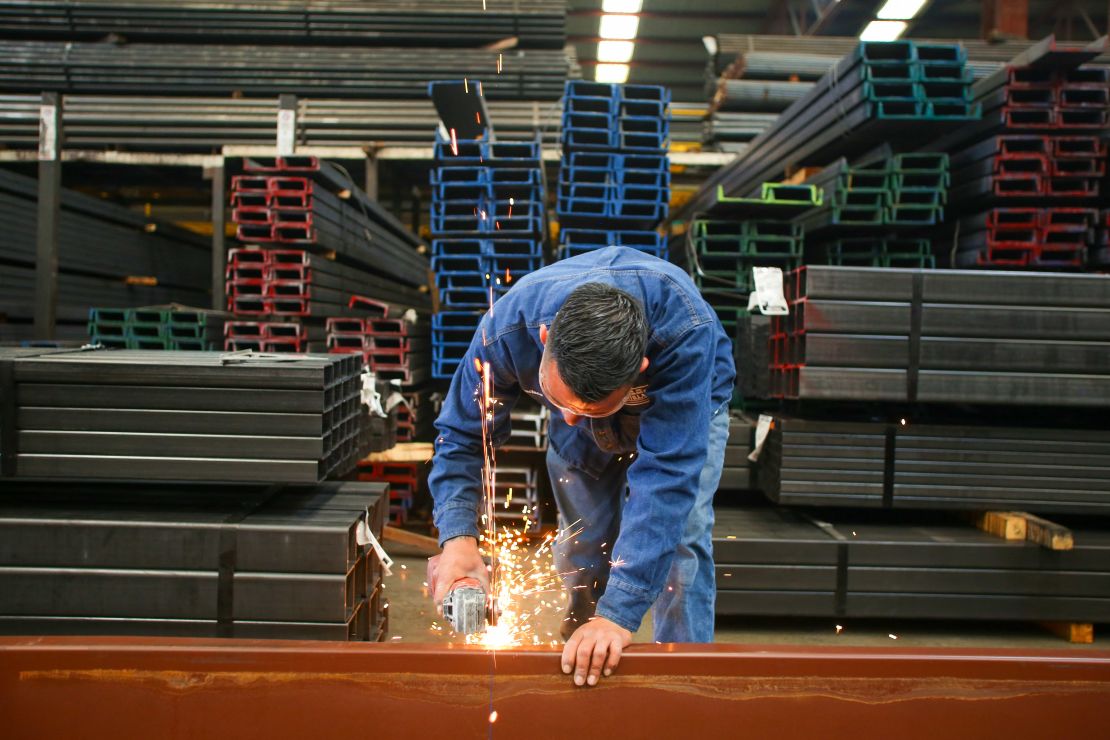What would be the impact on Mexico of the American tariffs of 25% to steel and aluminum?

Spanish CNN
–
The president of the United States, Donald Trump, imposed on Monday generalized tariffs of 25% on all imports of steel and aluminum in the country without exemptions.
These tariffs will take effect as of March 12, according to a statement from the White House.
The main countries that would be affected by this new measure would be Canada, Brazil and Mexico, whose joint sales cover half of the steel that imports the US market.

Ildefonso Guajardo-Secretary of Economy of Mexico in the government of Enrique Peña Nieto and negotiator of the Treaty between Mexico, the United States and Canada (T-MEC)-explained that the impact on the country would vary according to the response of the government of the president of Mexico , Claudia Sheinbaum.
Guajardo told CNN in Spanish that, if the Sheinbaum government decides to respond with similar steel tariffs, Mexico would be affected because the country matters more steel than exports to the United States. In other words, Mexico buys more steel from the United States than you sell. Therefore, if it imposes tariffs on steel imports, some Mexican industries – as the automotive – will be affected by the increases of costs caused by tariff taxes.
“(Steel) is fundamental because it is a good that is used in productive chains. That is why it is also not advisable to answer with (tariffs al) steel … (because) you use steel to make household goods that you export, use steel to make cars in case of laminated steels. There are steel uses in production chains, ”said the former official.
If Mexico answers with tariffs on steel imports, “you make your value chains make, you become less competitive,” Guajardo said, and added: “By putting generalized import tariff in the national construction ”.
Therefore, instead of reciprocal tariffs, Guajardo recommended that a tariff response be implemented with a product that does not represent a threat to the economy of Mexico.
Edmundo Enciso Villarreal, president of the commissions of Nearshoring and Foreign Trade of the Patronal Confederation of the Mexican Republic (Coparmex) in Mexico City, indicated in a statement sent to CNN that, with the US tariffs to steel, the most affected Mexican industries would be the automotive and Autopartes, construction, appliances, among others.
“The automotive and auto parts industry, which has been a fundamental pillar in the commercial relationship between Mexico and the United States, would suffer an increase in its costs, which would put the competitiveness of the region at risk against other markets. The construction would also be beaten, since the increase in steel and aluminum could slow down infrastructure projects and raise housing costs. Similarly, industries such as appliances, manufacturing in general, energy and transport would face challenges by increasing the cost of key supplies, ”said Villarreal.
The Secretary of Economy of Mexico, Marcelo Ebrard, said Tuesday that 25% tariffs on steel and aluminum announced by Trump are “a bullet in the foot to both countries.”
The official stressed that Mexico imports more steel from the United States and that the commercial balance is favorable for that country. “We import more than we export,” said the ex -chancellor.
According to the National Chamber of the Iron and Steel Industry (Canacero), the steel balance favored the United States compared to Mexico in 2.4 million tons and a value exceeding US $ 4,000 million in 2024.
For this reason, Ebrard emphasized that the tariffs announced Monday by the Trump government are not logical for Mexico.
“If we have more imports from the United States of steel and aluminum, it is not logical with what is being argued (the Trump administration) as a reason to put rates,” said the secretary.
Ebrard said they will consult with their US counterparts to present these arguments as soon as possible, remembering that the ratification of the Secretary of Commerce and the US commercial representative is still pending.

Carlos Slim: US tariffs will not solve problems
Although Mexico buys the US more steel than it sells, the country appears as the third exporter of this material to the United States.
Therefore, this would more affect the US, since key industries or consumers would end up absorbing the cost of tariffs on steel imports of the Trump government.
New steel and aluminum tariffs do not grant any exception – according to what is announced. Without exemptions, the Americans will be forced to pay higher invoices for the products in which the tariff would fall.
According to Justin Weidner, Deutsche Bank economist, for now it is impossible to accurately predict the amount of the bill and who will take the worst part.
If Americans cannot change to cheaper alternatives, they will probably end up paying the cost of tariffs, he said. It also depends on whether the different companies along the supply chain can absorb any of those costs for themselves.
American companies do not always say where all their raw materials or pieces come from, so it is difficult to say what could be more expensive with possible reciprocal tariffs, said Patrick Penfield, professor of supply chain management at Syracuse University.
It could be thought that higher tariffs would push companies to look for cheaper suppliers, but it is not so simple.
“You can’t close and open a supplier without further ado,” said Penfield. For example, there could be contracts at play or supply chains could depend on specific locations or suppliers.
Although the United States is not a key buyer of Chinese steel – in 2024 it imported only 1.8% of its total purchases from China – the Asian country does sell these materials to nations such as Canada and Mexico, which then exports them to the USA .Uu.
“The impact on the direct exports of steel from China to the US will be very small. In 2024, China only sold 891,700 tons of steel to the US, which represents 0.8% of total steel exports from China. However, these tariffs can stop the ‘transfers’ made by some Chinese exporters, ”said Vivian Yang, an analyst at the Mysteel consultant, to the EFE agency.
Yang explained that certain products are acquired by other countries and subsequently sent to the United States, while some are processed or manufactured abroad before their final sale.
“Therefore, Chinese semi -prosecuted steel would be affected in countries such as Mexico or Vietnam before being exported to the United States,” he concluded.
(tagstotranslate) tariffs
Source link




